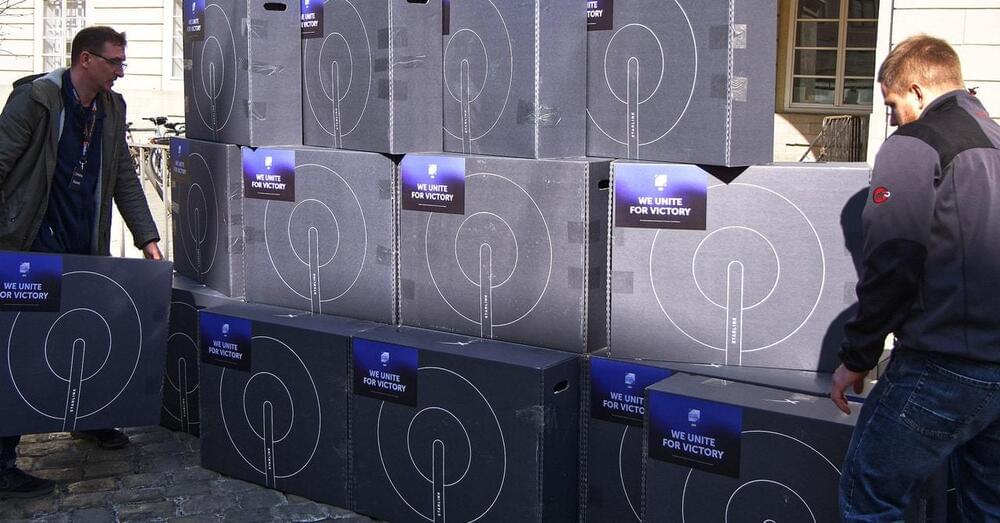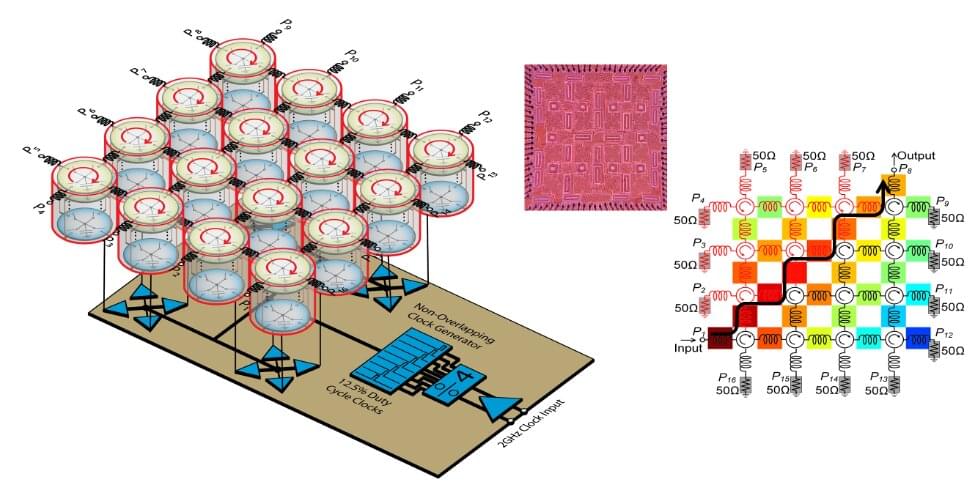Elon Musk’s intervention demonstrates how satellite internet could route around war or censorship far beyond Ukraine.



Researchers have used a widespread species of blue-green algae to power a microprocessor continuously for a year—and counting—using nothing but ambient light and water. Their system has potential as a reliable and renewable way to power small devices.
The system, comparable in size to an AA battery, contains a type of non-toxic algae called Synechocystis that naturally harvests energy from the sun through photosynthesis. The tiny electrical current this generates then interacts with an aluminum electrode and is used to power a microprocessor.
The system is made of common, inexpensive and largely recyclable materials. This means it could easily be replicated hundreds of thousands of times to power large numbers of small devices as part of the Internet of Things. The researchers say it is likely to be most useful in off-grid situations or remote locations, where small amounts of power can be very beneficial.

Some materials, like wood, are insulators that block the flow of electricity. Conductors, such as copper, allow for electricity to flow through them. Other materials—semiconductors—can be either/or depending on conditions such as applied electric field or temperature. Unlike wood or copper or silicon, though, topological insulators (TIs) are an exotic state of matter that is conductive on the surface, but not in the bulk. Such unique material properties have great scientific implications and could be of use in a range of technologies, including wireless communications, radar and quantum information processing.
Through a collaborative effort, the research labs of Aravind Nagulu, assistant professor in the Preston M. Green Department of Electrical & Systems Engineering at Washington University in St. Louis, and colleagues from Columbia University and the City University of New York’s Advanced Science Research Center have demonstrated the first implementation of an electromagnetic topological insulator on an integrated chip.
The collaborative project’s findings were published May 2 in the journal Nature Electronics.


On account of the improvement the Internet of things (IoTs) and smart devices, our lives have been noticeably facilitated in the past few years. Machines and devices are becoming more ingenious with the help of artificial intelligence and various sensors1,2. So, integrated circuits are necessary to provide convenient and effectual communication3 Since the first report on TENG by Wang’s group in 20124, triboelectric systems have been recognized as a proper choice to harvest and convert the energy from the environment5,6. Photodetectors, as one of the most significant types of sensors that can precisely convert incident light into electrical signals have attracted increasing attention in recent years. Various applications including photo-sensors, spectral analysis7,8, environment monitoring9, communication devices10, imaging11, take advantage of narrow band or broad band photodetectors from ultraviolet to terahertz wavelenght. Literature reviews show that the heterojunction/heterostructure based on 2D/3D materials have been widely used in PD applications. In fact, to attain high performance of PDs based heterojunction, the built-in electrical field is needed to suppress the photogenerated recombination and stimulating collection12. Although, Si based PDs offer reliably high performance results, their complexity and expensive manufacturing process have limited their expansion and adoptability for industrial purposes13,14,15. Hence, most available PDs are designed based on external power supplies such as electrochemical batteries for signal production and processing, their design not only increases the sensor’s dimension and weight, but also creates limitations for sensor maintenances16 which is not proper in the IoTs. In 2014, ZH Lin et al. and Zheng et al. represented an investigation on the self-powered PD based on TENG system3,17, and since then, self-driven PDs have been extensively investigated2,5,9,18,19,20. These devices can find potential applications in health monitoring systems such as heart checking21 and health protection from some detrimental radiation such as high levels of UV radiance22.
But in the other hand, even though TENGs could be promise for using in wearable electronics, they still inevitably have limitations in power generation, sensing range, sensitivity, and also the sensing domain for the intrinsic limitations of electrification23,24,25. Moreover, due to high voltage, low current, and alternating current output of the TENGs, they cannot be used in order to supply power to electronic devices effectively without using power management circuits (PMCs) based on the LC modules. There are several reports that describe the importance of the impedance matching of the TENG and PMC units for better energy storage efficiency of the pulsed-TENG26,27. Without using the PMC unit, there are some challenges as a result of synching the TENG, as the power supply, and the consumption element such as the PD device. These challenges include the process of matching the resistance of the device and the impedance of the TENG to achieve effective performance of the self-powered system6,28.
In this study an efficient battery-free photodetector based on bulk heterojunction SnS2 nanosheets and perovskite materials has been designed and powered employing three different TENGs (GO paper/ Kapton, FTO/Kapton and hand/ FTO). In the first step for circuit designing to have better performance of the photodetector in coupling with TENG, the effect load resistance amount in the circuit on the impedance matching the TENG and the inner resistance of the photodetector, has been investigated through output current amplitude. The investigation, shows that to achieve the high amount of the photocurrent, the load resistance should be positioned in both critical zone of the out-put voltage of the TENG and the resistance range of high power density production of the TENG. In the second step, for investigation the effect of the dark resistance of the photodetector on out-put current of the self-powered photodetector, a device with very lower initial resistance (All-oxide Cu2O/ZnO photodetector) has been used with and without different load resistance in the circuit; in this regard, it is concluding that the initial resistance is too important to have proper design impedance matching circuit.

As Wi-Fi is deployed more widely in cities, and perhaps at higher frequencies, it may depend on an abundant urban asset: streetlight poles.
To help ensure these networks work well, researchers at the National Institute of Standards and Technology (NIST) have developed and verified a novel model that will help wireless communications providers analyze how high to attach Wi-Fi equipment to light poles.
In general, the NIST team found that the optimal height depends on transmission frequency and antenna design. Attaching equipment at lower heights of around 4 meters is better for traditional wireless systems with omnidirectional antennas, whereas higher locations 6 or 9 meters up are better for the latest systems such as 5G using higher, millimeter-wave frequencies and narrow-beam antennas.
The world’s most advanced four-legged robot finally sees in color.
Over the last couple of years, we’ve continued to make improvements to Spot to better enable our customers. Today we’re adding to the list! https://bit.ly/3y68Ow1
Finally, Spot’s charger is now smarter and faster, bringing Spot’s newest battery models to full capacity in an hour or less. Users can refer to the OLED display for real-time information on battery charge and can continue to charge the robot directly or hot-swap batteries for continuous operation.
Expanded Payload Ecosystem
The robot itself is just one piece of the puzzle. The full Spot solution includes the community, customization options, and collaboration ecosystem that helps deliver the most value from the robot. Through Boston Dynamics and our partners, customers can outfit Spot with a variety of payloads, including additional cameras, sensors, laser scanners, and more. These payloads, paired with specialized software, enable Spot to collect and process the data that gives industrial teams valuable insights into what’s happening in their facilities. This ecosystem is constantly evolving, and today we are excited to announce two new pieces of hardware that will enable next-level computation, radio communications, and 5G connectivity.


I am going another route, and think Lifeboat, and others to may want to think about accounts with Mastodon, and others. We often empower what we don’t like and complain about. How does Mastodon work? Well for starters you can get a dedicated server, you moderate yourself, 🙄…and:
“Mastodon is a social media network comprised of nodes (called ”servers” or ”instances”), each running special software. Anyone can run their own Mastodon instance (if they have the proper dedicated server), which can then link to others in a federation or remain private. Individuals or companies can have complete control over individual Mastodon servers, so there are still centralized points of administration, but it’s not as concentrated as in the case of Twitter, Tumblr, or Facebook.
The Mastodon software is open source. It is based on an open-source social networking protocol called ActivityPub, which is developed by the World Wide Web Consortium (the same organization that maintains standards for the web.)
https://www.howtogeek.com/801927/a-twitter-alternative-how-does-mastodon-work/
Mastodon is an open source decentralized social network — by the people for the people. Join the federation and take back control of your social media!